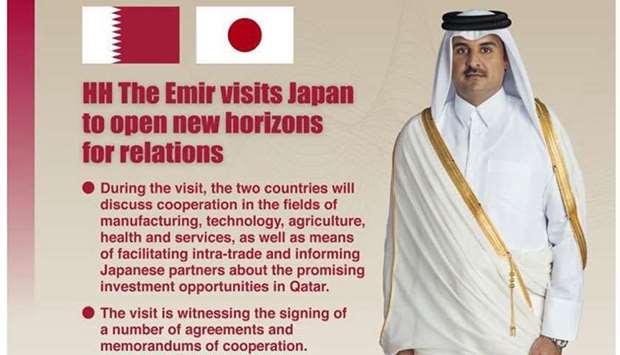After the successful visit to the Republic of Korea, His Highness the Amir Sheikh Tamim bin Hamad al-Thani arrived in Japan for a two-day official visit.
HH the Amir's visit to japan is part of an Asian tour that also includes China.
This Asian tour is the second by HH the Amir since the beginning of the unjust blockade imposed on Qatar in June 2017, preceded by a tour to Malaysia, Singapore and Indonesia in October 2017.
The tour marks a new era in Qatar's relations with three Asian economic powers and provides a clear indication of the determination of the Qatari leadership to begin new chapters in cooperation with the three countries and develop it to advanced stages of long-term strategic partnerships in order to serve the interests of Qatar and the goals of its National Vision 2030 as well as its people's aspirations for progress and prosperity.
During the visit, HH the Amir and the accompanying delegation will discuss with Japan’s Emperor Akihito, Prime Minister Shinzo Abe and senior Japanese officials means to enhance co-operation and strategic partnership in different fields between Doha and Tokyo to serve the interests of the two countries and their friendly peoples, and will exchange views on all regional and international issues of common concern.
The relations between the two countries have been characterised by a deep and fruitful cooperation. Economic exchanges have been a backbone of these relations, which have been witnessed over more than four decades. Thanks to the strong political will of the two countries, solid foundations for bilateral cooperation have been established in all economic, cultural, technical, scientific, defense and security fields.
Diplomatic relations between Qatar and Japan were established in 1972 and they focused on the economic field. However, during the following years, they diversified to various fields. The mutual visits at the level of senior officials of the two countries have contributed to the development and expansion of bilateral relations. Among the most important visits in recent years from the Qatari side was HH the Amir's visit to Japan in February 2015 and the visit of HH the Father Amir Sheikh Hamad bin Khalifa al-Thani and Her Highness Sheikha Moza bint Nasser, Chairperson of Qatar Foundation for Education, Science and Community Development (QF), in 2005.
On the other hand, the most important visits from the Japanese side to Qatar were the visit of Japan’s Crown Prince Naruhito and Princess Masako to Doha in 1994, and the visits of the Prime Minister Shinzo Abe to Doha in August 2013 and May 2007.
The bilateral relations between the two countries have been strengthened through a number of agreements and memorandums of understanding covering bilateral cooperation in the areas of defense and energy, political and security dialogue, visas exemption for diplomatic and official passport holders, avoidance of double taxation and prevention of financial evasion, education and scientific research, youth and sports, tourism and understanding between chambers of commerce and industry, scientific research, exchange of experiences, university students, services and air transport, and training of Qatari engineers.
Japan is an important trading partner for Qatar as one of the largest energy importers. Qatar currently ranks fourth in the world as Japan's largest supplier of energy resources, especially natural gas, while Qatar's main imports from Japan are automobiles, heavy equipment, electronic equipment, iron and steel products, rubber and its products.
In the context of the booming economic relations between the two countries, the value of Qatari exports to Japan in 2017 reached to about QR42.12bn while the value of imports reached to about QR5.75bn. Qatar's trade surplus with Japan rose by 35% year-on-year in 2018 to $13.5bn, compared with $9.9bn in 2017.
Major Japanese companies are contributing to Qatar's vital infrastructure projects, particularly in Qatar's hosting for the 2022 World Cup, such as Hamad International Airport, Qatar Metro, power generation and desalination plants.
The cooperation between Qatar and Japan extends beyond energy and infrastructure projects to include cooperation in promising vital sectors, including joint investment in power plants in other countries and the production of new types of clean energy, especially hydrogen at competitive prices. The Human Genome Project (HGP) aims to obtain more accurate and applicable medical treatment for all humans, as well as the Golden Pass LNG project, a large natural gas plant in Texas, the Es'hailSat satellite project, helium projects, steel bars, maintenance and systems.
Following the 2011 earthquake and tsunami disaster that struck northeastern Japan, HH the Amir donated $100mn to assist the victims that were affected, which was one of the largest material aid provided by other countries to Japan after the disaster. In the aftermath, a Qatari fund was established to implement reconstruction projects in the affected areas, with many being completed in the fields of education, health and fisheries, which benefitted 649,000 Japanese citizens across all sectors directly and indirectly.
Japan's vision is consistent with the country's position on the Gulf crisis and supports the solution through negotiations, dialogue and mediation by Kuwait.
Qatar and Japan share similar views on international and humanitarian issues, with both countries firmly believe that international peace and security in the world can be achieved through dialogue based on the principle of equality, adherence to the provisions of international law, implementation of international legitimacy resolutions, respect for the principles of human and peoples' rights and the activation of the mechanisms of the United Nations Charter for a peaceful settlement.
Japan is one of the most advanced countries, with the Japanese economy being the third largest economy in the world, in terms of GDP, after the United States and China. Japan also ranks second in communications and biotechnology and continuously develops in the pharmaceutical and space industries. Japan's gross national product (GNP) ranks third in the world and Japanese brands are internationally recognised. Japan is the world's first iron and steel producer, third in refining oil and first in automobile production. (QNA)

